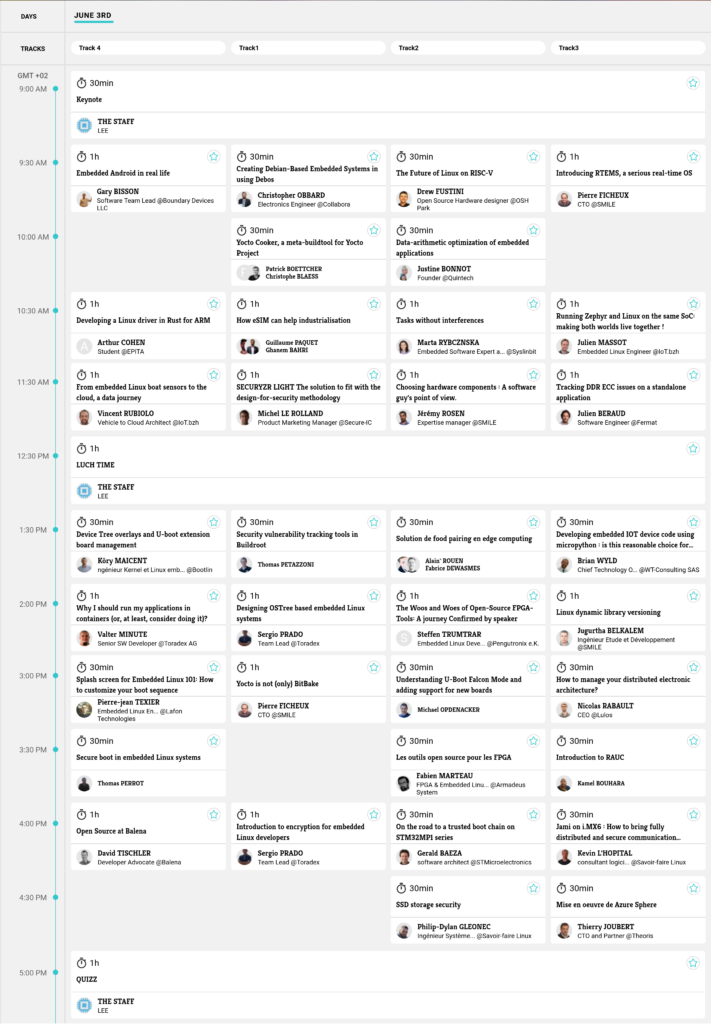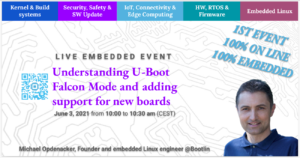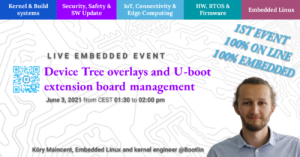The schedule for the next edition of Live Embedded Event has been published! This 100% online and free conference will take place on June 3rd, 2021. Thanks to the proposals received, the event will feature 4 tracks during the entire day, covering a wide range of topics: hardware for embedded systems, embedded Linux, RTOS, IoT, FPGA, RISC-V, and more.

Bootlin is once again part of the organization team for this event, and in addition 5 talks proposed by Bootlin have been selected into the schedule. See below the details of our talks.
Understanding U-Boot Falcon Mode and adding support for new boards, Michael Opdenacker
The Falcon Mode is a U-Boot feature that allows to directly load the operating system kernel from the first stage of U-Boot (a.k.a. “SPL”), skipping the second stage of U-Boot. Doing this can save up to 1 second in the boot process, and this way, you can keep a full featured U-Boot that you can still fall back to for maintenance or development needs. However, using Falcon Mode is not always easy, as it requires extra code that most boards supported by U-Boot don’t have yet. At Bootlin, we had to add such support to U-Boot for several boards. This presentation will explain how Falcon Mode booting actually works in U-Boot and the implementation and usage choices made by U-Boot developers. It will show you how to add such Falcon Mode support to U-Boot for your own board.
Talk given by Michael Opdenacker, at 10:00 AM CEST on June 3rd, 2021.
Link to the talk (registration required).
Introduction to RAUC, Kamel Bouhara
In embedded systems, deploying firmware updates in the field has now become an obvious requirement, to ensure that security vulnerabilities are addressed, that bugs are fixed, and new functionalities can be delivered to the users. Among a range of different open-source solutions, RAUC provides an interesting firmware update mechanism for embedded system. In this talk, we will introduce the main features of RAUC, its integration in build systems such as Buildroot or the Yocto Project, as well as its integration with the U-Boot and Barebox bootloaders. Finally we will explore some common update scenarios that are fully supported by RAUC features.
Talk given by Kamel Bouhara, at 3:30 PM CEST on June 3rd, 2021.
Link to the talk (registration required).
Security vulnerability tracking tools in Buildroot, Thomas Petazzoni
Buildroot is a popular and easy to use embedded Linux build system. With the increasing concern around security vulnerabilities affecting embedded systems, and the need to keep them updated, Buildroot has been extended with new tooling for security vulnerability tracking. This tooling allows to monitor the CVEs that affect the packages present in Buildroot. In this talk, we will introduce the principle of CVEs and CPEs, present the tools now available in Buildroot to help keep track of the security vulnerabilities, show how they can be used for a project and identify the current limitations of this tooling.
Talk given by Thomas Petazzoni, at 1:30 PM CEST on June 3rd, 2021.
Link to the talk (registration required).
Secure boot in embedded Linux systems, Thomas Perrot
Secure boot is a integrity mechanism, based on signature verification, that allows to detect software corruption or malicious code, during the boot process. Implementing secure boot is not always obvious, as it requires multiple stages of verification, at the bootloader, Linux kernel and root filesystem level, as well as integration into the build system, CI infrastructure, firmware upgrade mechanism, and more. Based on a recent experience to bring secure boot on an NXP i.MX8 platform, Thomas will present how to implement the chain of trust from the SoC ROM code to the root filesystem, as well as other considerations related to the implementation of secure boot. While the presentation will use the i.MX8 as an example, most of the discussion will apply to other platforms as well.
Talk given by Thomas Perrot, at 3:30 PM CEST on June 3rd, 2021.
Link to the talk (registration required).
Device Tree overlays and U-boot extension board management, Köry Maincent
In this talk, we will start by introducing the mechanism of Device Tree Overlays, which are a way of extending the Device Tree itself to describe additional hardware. We will show how Device Tree Overlays are written, compiled, and applied to a base Device Tree, and what is the status of Device Tree Overlays support in U-Boot and Linux. We will take the example of the BeagleBoard.org project, showing how Device Tree overlays are used to make CAPE extension boards compatible with different boards. Finally, we will describe our proposal, already submitted to the community, to add an extension board management facility to U-Boot, which automatically detects, loads and applies the appropriate Device Tree Overlays depending on the extension boards that are detected.
Talk given by Köry Maincent, at 1:30 PM CEST on June 3rd, 2021.
Link to the talk (registration required).





